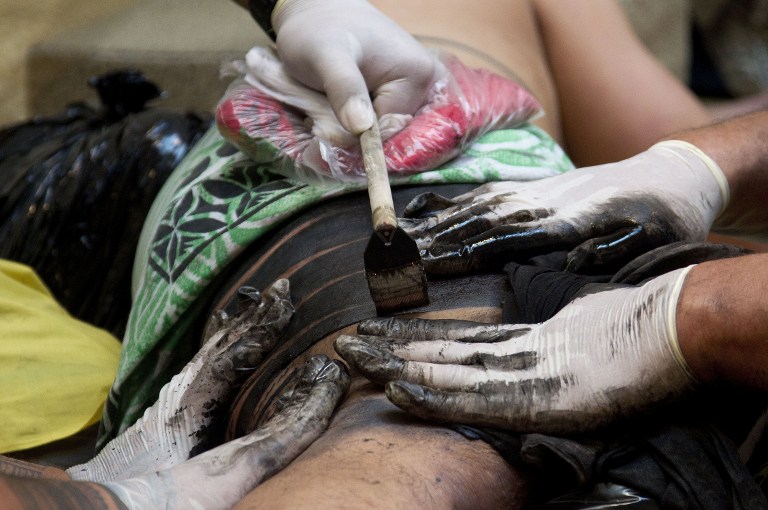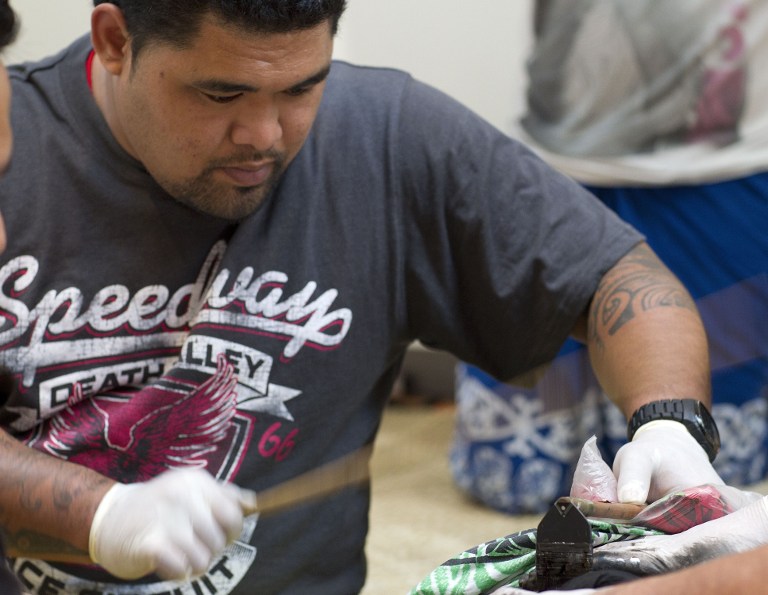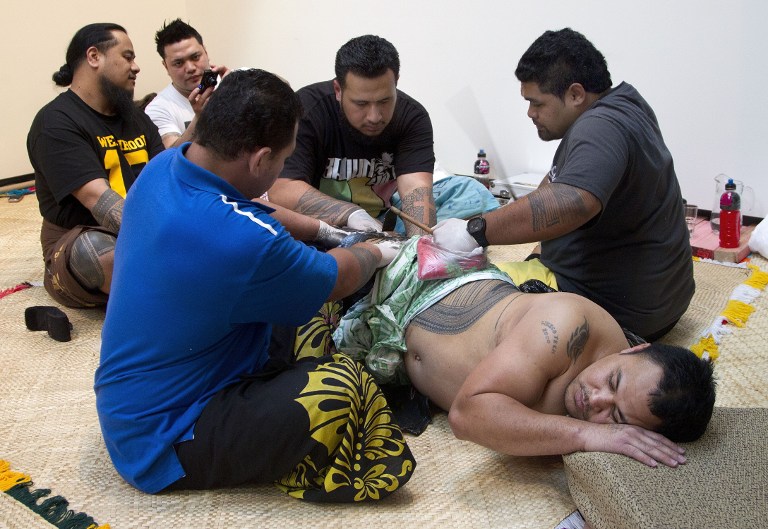
Once banned by Christian missionaries as a barbaric, heathen custom, traditional tattooing is making a comeback in the Cook Islands as locals in the Pacific nation reconnect with their cultural roots.
Body art was common in South Pacific nations such as the Cooks, Tonga, Tahiti and Samoa before missionaries arrived in the 19th Century -- so much so that the English word tattoo is derived from the Polynesian terms "tatau" and "tatatau".
Applied with bone or shell chisels, tattoos were a rite of passage for Polynesian men and paintings from the the early days of European contact show muscular warriors with elaborate designs covering much of their bodies.
"If you were out in a waka (canoe) and came across another boat, you could tell from their tattoos where those guys came from," said Luther Berg, who runs a tattoo studio at the back of Boogies Bar in the capital Avarua.





Once banned by Christian missionaries as a barbaric, heathen custom, traditional tattooing is making a comeback in the Cook Islands as locals in the Pacific nation reconnect with their cultural roots.
Body art was common in South Pacific nations such as the Cooks, Tonga, Tahiti and Samoa before missionaries arrived in the 19th Century -- so much so that the English word tattoo is derived from the Polynesian terms "tatau" and "tatatau".
Applied with bone or shell chisels, tattoos were a rite of passage for Polynesian men and paintings from the the early days of European contact show muscular warriors with elaborate designs covering much of their bodies.
"If you were out in a waka (canoe) and came across another boat, you could tell from their tattoos where those guys came from," said Luther Berg, who runs a tattoo studio at the back of Boogies Bar in the capital Avarua.

Master tattooist Su'a Paul Sulu'ape using a traditional method to tattoo. ©AFP
"You could identify whether they were from Tonga or wherever. More specifically, if you were among that group, you could tell which island they came from, right down to their family line and genealogy," he told AFP.
Su'a Paul Sulu'ape, who is descended from a line of master Samoan tattooists, visited the Wellington City Gallery in New Zealand in September to demonstrate the ancient techniques.
Among those he tattooed was Ricky Masoe, who lay prone on a mat as Sulu'ape carved into his skin the precise geometric lines of a pe'a sogaimiti, a design that scrolls from the upper waist to the knees.
Betraying only the occasional wince of pain as the club cracked against the chisel, Masoe held his wife's hand while Sulu'ape worked, assisted by four men, one to stretch the skin, another to wipe away the blood and the others holding Masoe's limbs still.

Master tattooist Su'a Paul Sulu'ape. ©AFP
Sulu'ape welcomed the tattoo revival in the Cook Islands and said a similar phenomenon was occurring in Tonga, where his father was helping teach locals traditional techniques.
-- "When a person gives you their skin" --
Author Therese Mangos, whose history of Cook Islands tattooing "Patterns of the Past" was published last year, said missionaries took Biblical warnings against marking the body literally, and zealously set about banning tattoos.
In the Cook Islands, anyone who received a tattoo was fined or given punishment work details under rules imposed by church authorities, Mangos said.
"It was seen as very shameful and against Christianity," she said. "There's evidence in the archives that some tattoos were physically removed and scraped off people's bodies with pieces of coral."
The result, with the exception of Samoa and New Zealand, was a form of cultural amnesia across Polynesia, where traditional tattooing virtually died out.
Many once-revered designs were lost and the ancient technique of applying tattoos by striking an ink-soaked bone chisel with a wooden club resembling a spatula was no longer practised.
Mangos said interest in tattooing revived in the Cooks in the 1990s as part of a broader cultural movement which involved locals rediscovering their heritage through traditional arts and crafts.
Croc Coulter, one of the few tattooists in the island nation now practising the traditional technique, said that while some designs had been lost forever, others survived through carving, weaving and tapa (bark cloth art).
Coulter said body art was a type of language in Polynesia and tattooists underwent a lengthy apprenticeship before being considered worthy of working on traditional designs with a chisel and club.
He said the growing popularity of Polynesian designs among Westerners had led to concerns about tattooists in Europe stealing artwork they had seen on the Internet simply for its aesthetic appeal, with no regard for its cultural meaning.

Ricky Masoe (bottom R) lying down as assistants (L) hold his skin tight while master tattooist Su'a Paul Sulu'ape (R) uses a traditional method to tattoo him. ©AFP
"When a person gives you their skin, it's an unusual relationship of trust," he said. "You don't want to stuff it up.
"It has to reflect the tradition of their family line or island. That comes with a lot of responsibility."
Not all efforts to suppress tattooing were successful, the practice remains strong among New Zealand Maori and receiving a customary design is still regarded as an important step on the passage to manhood in Samoa.
Tatooist Sulu'ape said he believes the missionaries opposed tattooing because it is a bloody, painful process when performed with customary tools, but said it was such an integral part of Samoan culture that the church was unable to stop it there.
Sulu'ape said he could not understand why the missionaries worked so vigorously elsewhere in Polynesia to stop a practice that he regards as a vital part of the region's cultural identity.
"For me, to be able to pass down this knowledge and art from generation to generation, it's a gift from God," he said.
by Neil Sands from AFP


 +7 (777) 001 44 99
+7 (777) 001 44 99















































